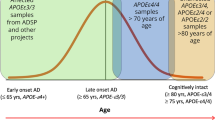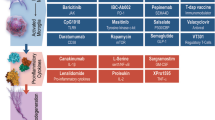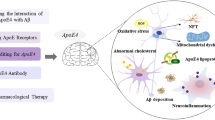Abstract
ATP-binding cassette transporter A1 (ABCA1) is a membrane-associated protein which has attracted considerable attention as a candidate gene for Alzheimer’s disease (AD) based on its function as a key factor in lipid metabolism by mediating cellular cholesterol efflux, the rate-limiting step in the production of nascent high-density lipoprotein (HDL) particles. The relationship between ABCA1 common variations (R219 K rs2230806, I883 M rs4149313 and R1587 K rs2230808) and AD has been reported in various ethnic groups; however, these studies have yielded contradictory results. To investigate this inconsistency, we performed a meta-analysis of 13 studies involving a total of 12,248 subjects to evaluate the effect of ABCA1 on genetic susceptibility for AD. Overall, the summary OR of AD was 1.01 (95 % CI: 0.93–1.10; P = 0.77), 1.10 (95 % CI: 0.96–1.26; P = 0.16), and 1.08 (95 % CI: 0.96–1.23; P = 0.21) for R219 K, I883 M and R1587 K polymorphism, respectively. No significant results were observed in dominant and recessive when compared with wild genotype for these polymorphisms. In the stratified analyses by ethnicity and sample size, no evidence of any gene-disease association was obtained. In conclusion, the present meta-analysis does not support the notion that common SNPs on ABCA1 is a major genetic risk factor for AD.



Similar content being viewed by others
References
Tanzi RE (1999) A genetic dichotomy model for the inheritance of Alzheimer’s disease and common age-related disorders. J Clin Investig 104:1175–1179
Hardy J (1997) Amyloid, the presenilins and Alzheimer’s disease. Trends Neurosci 20:154–159
Strittmatter WJ, Saunders AM, Schmechel D, Pericak-Vance M, Enghild J, Salvesen GS, Roses AD (1993) Apolipoprotein E: high-avidity binding to beta-amyloid and increased frequency of type 4 allele in late-onset familial Alzheimer disease. Proc Natl Acad Sci U S A 90:1977–1981
Wollmer MA, Streffer JR, Lütjohann D et al (2003) ABCA1 modulates CSF cholesterol levels and influences the age at onset of Alzheimer’s disease. Neurobiol Aging 24:421–426
Yancey PG, Bortnick AE, Kellner-Weibel G, de la Llera-Moya M, Phillips MC, Rothblat GH (2003) Importance of different pathways of cellular cholesterol efflux. Arterioscler Thromb Vasc Biol 23:712–719
Hirsch-Reinshagen V, Zhou S, Burgess BL et al (2004) Deficiency of ABCA1 impairs apolipoprotein E metabolism in brain. J Biol Chem 279:41197–41207
Rust S, Rosier M, Funke H et al (1999) Tangier disease is caused by mutations in the gene encoding ATP-binding cassette transporter 1. Nat Genet 22:352–355
Clee SM, Zwinderman AH, Engert JC et al (2001) Common genetic variation in ABCA1 is associated with altered lipoprotein levels and a modified risk for coronary artery disease. Circulation 103:1198–1205
Mantel N, Haenszel W (1959) Statistical aspects of the analysis of data from retrospective studies of disease. J Natl Cancer Inst 22:719–748
DerSimonian R, Laird N (1986) Meta-analysis in clinical trials. Control Clin Trials 7:177–188
Woolf B (1955) On estimating the relation between blood group and disease. Ann Hum Genet 19:251–253
Egger M, Davey Smith G, Schneider M, Minder C (1997) Bias in meta-analysis detected by a simple, graphical test. British Med J 315:629–634
Begg CB, Mazumdar M (1994) Operating characteristics of a rank correlation test for publication bias. Biometrics 50:1088–1101
Sun YM, Li HL, Guo QH, Wu P, Hong Z, Lu CZ, Wu ZY (2012) The polymorphism of the ATP-binding cassette transporter 1 gene modulates Alzheimer disease risk in Chinese Han ethnic population. Am J Geriatr Psychiatry 20:603–611
Khorram Khorshid HR, Gozalpour E, Kamali K, Ohadi M, Karimloo M, Shahhosseiny MH (2011) The association between sporadic Alzheimer’s disease and the human ABCA1 and APOE gene polymorphisms in Iranian population. Iran Red Crescent Med J 13:256–262
Li H, Wetten S, Li L et al (2008) Candidate single-nucleotide polymorphisms from a genomewide association study of Alzheimer disease. Arch Neurol 65:45–53
Sundar PD, Feingold E, Minster RL, DeKosky ST, Kamboh MI (2007) Gender-specific association of ATP-binding cassette transporter 1 (ABCA1) polymorphisms with the risk of late-onset Alzheimer’s disease. Neurobiol Aging 28:856–862
Wahrle SE, Shah AR, Fagan AM et al (2007) Apolipoprotein E levels in cerebrospinal fluid and the effects of ABCA1 polymorphisms. Mol Neurodegener 2:7
Wang F, Jia J (2007) Polymorphisms of cholesterol metabolism genes CYP46 and ABCA1 and the risk of sporadic Alzheimer’s disease in Chinese. Brain Res 1147:34–38
Rodríguez-Rodríguez E, Vázquez-Higuera JL, Sánchez-Juan P et al (2010) Epistasis between intracellular cholesterol trafficking-related genes (NPC1 and ABCA1) and Alzheimer’s disease risk. J Alzheimers Dis 21:619–625
Chu LW, Li Y, Li Z, Tang AY, Cheung BM, Leung RY, Yik PY, Jin DY, Song YQ (2007) A novel intronic polymorphism of ABCA1 gene reveals risk for sporadic Alzheimer’s disease in Chinese. Am J Med Genet B Neuropsychiatr Genet 144B:1007–1013
Shibata N, Kawarai T, Lee JH et al (2006) Association studies of cholesterol metabolism genes (CH25H, ABCA1 and CH24H) in Alzheimer’s disease. Neurosci Lett 391:142–146
Kölsch H, Lütjohann D, Jessen F, Von Bergmann K, Schmitz S, Urbach H, Maier W, Heun R (2006) Polymorphism in ABCA1 influences CSF 24S-hydroxycholesterol levels but is not a major risk factor of Alzheimer’s disease. Int J Mol Med 17:791–794
Katzov H, Chalmers K, Palmgren J et al (2004) Genetic variants of ABCA1 modify Alzheimer disease risk and quantitative traits related to beta-amyloid metabolism. Hum Mutat 23:358–367
Li Y, Tacey K, Doil L et al (2004) Association of ABCA1 with late-onset Alzheimer’s disease is not observed in a case–control study. Neurosci Lett 366:268–271
Mody N, Agouni A, McIlroy GD, Platt B, Delibegovic M (2011) Susceptibility to diet-induced obesity and glucose intolerance in the APP (SWE)/PSEN1 (A246E) mouse model of Alzheimer’s disease is associated with increased brain levels of protein tyrosine phosphatase 1B (PTP1B) and retinol-binding protein 4 (RBP4), and basal phosphorylation of S6 ribosomal protein. Diabetologia 54:2143–2151
Fitzgerald ML, Morris AL, Rhee JS, Andersson LP, Mendez AJ, Freeman MW (2002) Naturally occurring mutations in the largest extracellular loops of ABCA1 can disrupt its direct interaction with apolipoprotein A-I. J Biol Chem 277:33178–33187
Frikke-Schmidt R, Nordestgaard BG, Jensen GB, Tybjaerg-Hansen A (2004) Genetic variation in ABC transporter A1 contributes to HDL cholesterol in the general population. J Clin Investig 114:1343–1353
Schmitz G, Kaminski WE, Orsó E (2000) ABC transporters in cellular lipid trafficking. Curr Opin Lipidol 11:493–501
Acknowledgments
This study was supported by China Postdoctoral Science Foundation Funded Project (20100480542, 201104227), Nature Science Foundation of Shanghai (12ZR1436000) and Youth Innovation Promotion Association, Chinese Academy of Sciences.
Author information
Authors and Affiliations
Corresponding authors
Additional information
Xiao-Feng Wang and Yuan-Wu Cao contributed equally to this study and should be considered as co-first authors.
Electronic supplementary material
Below is the link to the electronic supplementary material.
Rights and permissions
About this article
Cite this article
Wang, XF., Cao, YW., Feng, ZZ. et al. Quantitative assessment of the effect of ABCA1 gene polymorphism on the risk of Alzheimer’s disease. Mol Biol Rep 40, 779–785 (2013). https://doi.org/10.1007/s11033-012-2115-9
Received:
Accepted:
Published:
Issue Date:
DOI: https://doi.org/10.1007/s11033-012-2115-9




